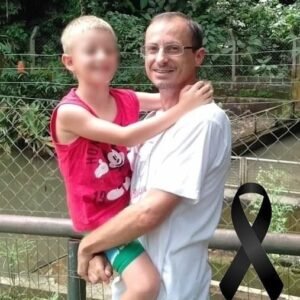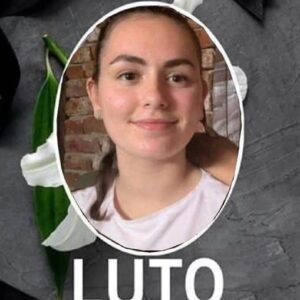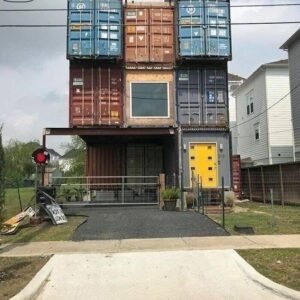When Rodrigo Alarcón’s only daughter, Camila, was diagnosed with a terminal illness, the world he’d built on wealth and power collapsed overnight. For years, he’d solved every challenge with money—buying influence, silencing problems, and fixing lives with a signature. But this was something no fortune could control. The doctors from Madrid to Zurich had all said the same: three months. That was all the time his little girl had left.
Camila was seven, small and pale, with eyes that once lit up the grand Alarcón mansion. Now she barely had the strength to lift her head. Machines hummed quietly around her room, and Rodrigo—accustomed to boardrooms and negotiations—could only sit helpless, watching her fade. His wife had passed years earlier; now his daughter, the last thread of his soul, was slipping away.
The house had grown heavy with silence, except for one gentle sound: Claudia’s lullabies. The maid had been with them for years—quiet, loyal, often invisible in the background of Rodrigo’s busy life. But she loved Camila like her own. Late at night, she would sit by the girl’s bedside, humming softly and brushing her hair while the others slept.
One evening, as Rodrigo sat in his study drowning in paperwork he couldn’t focus on, Claudia approached him. Her hands trembled as she spoke. “Señor, I know of someone—a doctor. He helped my brother when the hospitals gave up on him. He’s retired now, lives deep in the mountains. But if you’d allow it… he might save Camila.”
Rodrigo’s response was sharp, almost cruel. “I’ve spent millions on the best medical minds in Europe. You think some mountain hermit can do what they couldn’t?” His words hung heavy in the air, but beneath the anger was fear.
Claudia lowered her gaze. “My brother was given days to live, sir. That was ten years ago. Please. I can’t promise miracles, but this man saved him when no one else would.”
Rodrigo dismissed her at first. But that night, he heard Camila coughing in her sleep—a weak, broken sound—and something inside him cracked. Pride lost its grip. He called Claudia to his study before dawn. “We leave in the morning,” he said simply.
They traveled discreetly, no chauffeurs, no press, no entourage. Just a desperate father, his dying daughter, and a woman driven by quiet faith. The road wound through the mountains until they reached a remote village, where time seemed to stand still.
The doctor, an old man with silver hair and steady eyes, examined Camila for a long time. When he finally spoke, his voice was calm but firm. “Her illness is real, but so is her sorrow. The body can’t heal when the heart has given up. My treatment will help her body fight—but you, Señor Alarcón, must help her spirit.”
Rodrigo frowned. “You mean psychology? Positive thinking?”
“I mean love,” the doctor said. “You’ve given her comfort, but not presence. She needs her father, not her fortune.”
The treatment began—an odd mix of herbal medicines, therapy, and routines built around laughter, song, and human warmth. Rodrigo stayed by her side day and night. He learned how to make her smile again, how to tell bedtime stories instead of reading reports, how to hold her without thinking of what he couldn’t control.
Claudia became the heart of it all. She cooked simple meals, kept the fire burning, and sang songs that filled the small cabin with peace. She taught Rodrigo how to pray again—not to beg, but to hope.
Weeks passed. Then, something extraordinary happened. Camila’s color returned. She laughed one morning—a real laugh, full and bright. Her appetite came back. The cough faded. The doctor watched in quiet satisfaction. “The body follows where the heart leads,” he said softly.
By the third month, Camila was running through the garden outside the cabin, her hair flying in the wind. Rodrigo watched her with tears in his eyes, unable to believe what he was seeing.
When they returned to the city, the doctors couldn’t explain it. “Spontaneous remission,” they called it. Rodrigo called it something else—grace.
He reinstated Claudia not as a maid, but as part of the family. “You saved my daughter,” he told her. “You reminded me what it means to be human.”
Under her care and the doctor’s guidance, Camila continued to thrive. Rodrigo transformed, too. The man who once measured life in profits and possessions now found wealth in small, ordinary moments—Camila’s laughter, Claudia’s songs, the warmth of a shared meal.
Months later, he visited the mountain doctor to thank him. But the villagers told him the old man had passed away quietly in his sleep. “He said his final patient was a little girl who reminded him why he had become a doctor,” one villager said.
Rodrigo stood at the edge of the mountain, wind whipping through his hair, feeling something he hadn’t felt in decades—humility.
Years later, Camila would grow into a compassionate young woman, studying medicine to carry on the healer’s legacy. She often said, “He didn’t just cure me—he cured my father.”
Rodrigo knew she was right. In saving his daughter, Claudia and that old doctor had saved him too—from the emptiness that money could never fill.
When people asked how the girl who had three months to live survived, Rodrigo always gave the same answer: “Because someone believed when I didn’t. And that belief was worth more than everything I owned.”
In the end, the mansion that once echoed with silence now rang with laughter and music again. Claudia stayed with the family until her final days, cherished and loved, not as a servant—but as the woman who gave them back their lives.
And every year, on the anniversary of Camila’s recovery, they would drive back to that quiet mountain village, place fresh flowers by the doctor’s grave, and whisper a simple prayer of gratitude for the miracle that had begun with faith, love, and the courage of one humble heart.





